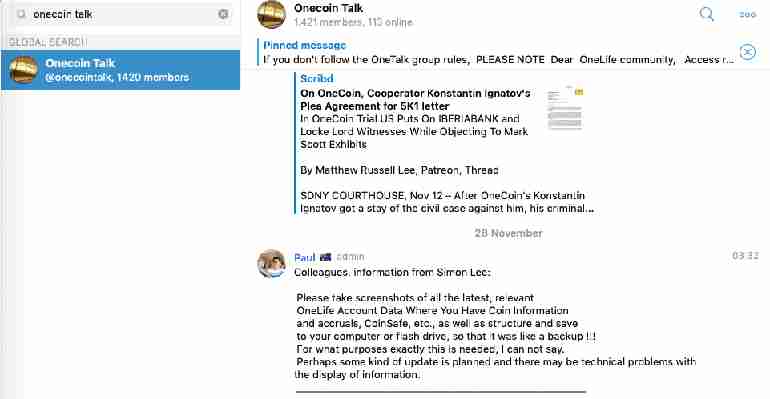Some of the websites associated with “ cryptocurrency ” scam OneCoin have been taken offline as legal investigations into the scheme continue.

Earlier today, more websites associated with OneCoin have also gone offline. B oth oneacademu and oneworldfoundationu are inactive. These websites are also placed in “server hold” status.
At the time of writing, another website associated to the scam, Onelifeu remains active.
Towards the end of November, members of the Onecoin Talk Telegram channel were advised by a group admin to “take screenshots” of their relevant OneLife account data to create a backup.


No reason was given, but it was suggested that there might have been an impending update or a technical problem with the display of information.
The directive was said to have come from Simon Lee, a known OneCoin promoter .
In reality, the message looks to have served no other purpose than to divert attention away from the fact the websites are now under legal investigation.
A brief scroll through the Onecoin Talk chat log shows there are still numerous individuals that appear to support the scam and continue to disregard the growing body of evidence against its figurehead Dr. Ruja Ignatova.
Some even support Binance CEO Chanpeng Zhao’s war on “fake news,” saying OneCoin should follow suit and sue the media that have supposedly misrepresented the project.
In November, Mark Scott a former lawyer was found guilty of helping launder hundreds of thousands of dollars on behalf of the OneCoin scam.
Prior to that, Ignatova’s brother Konstantin Ignatov pleaded guilty to money laundering and fraud charges
Elon Musk’s 420th Starlink satellite is more than just a weed joke
Elon Musk‘s internet-from-space project Starlink sent 60 new satellites into low-orbit without problem on Wednesday, bringing the total size of its constellation to — wait for it — 420.

The SpaceX founder was quick to laud Starlink’s success with a cute tweet, complete with satellite and winky face emoji.
Musk’s apparent happiness is understandable, given that the SpaceX Falcon 9 rocket carrying the satellites actually stuck the landing this time, after failing to do so on two previous missions.
The tweet also coyly references the “ taking Tesla private at $420 ” controversy of August 2018, which led to Musk’s ousting as Tesla chairman and a $20 million fine.
Starlink is now ‘initially operational’ (supposedly)
SpaceX‘s Starlink project is the embodiment of one of Musk’s many visions: A giant monetizable web of satellites that constantly beam super-fast broadband to Earth.
While having exactly 420 satellites in orbit is fun, it really means that Starlink can begin “initial operational capability.” That takes at least 400, according to Musk, who maintained the project will be economically viable at 1,000 satellites in May last year.
One thousand satellites is really only the beginning for Starlink. Musk has audacious plans to grow his constellation to as many as 12,000 by 2027 — which is almost six times the number of all operational spacecraft orbiting Earth.
Bezos and Musk, our space-powered internet cowboys
Musk isn’t the only billionaire with eyes for space-powered broadband. Amazon’s Jeff Bezos, the world’s richest man, wants his own 3,500-strong constellation through Project Kuiper, but it’s yet to launch any of its own spacecraft as it’s still in an R&D phase .
There was also OneWeb, the Canadian startup looking to provide cheap broadband to rural communities. Partly backed by Virgin’s philanthropist caricature Richard Branson, OneWeb launched 74 of its 650 planned satellites, but folded earlier this year before it could offer a commercial product.
As Starlink inches closer to selling space broadband to you or me, one might reconsider the possibility that Musk might take SpaceX public as it opens more revenue streams, or even spin-off Starlink into its own offering.
However, Musk was recently forced to shoot those rumors down by the company’s chief operating officer, who’d hinted to a group of investors that Starlink is the “right kind of business” to IPO. Musk, who has repeatedly denied having plans to list SpaceX, said at the time : “We have to make it work,” referring to Starlink.
Well, we’re soon going to find out if it does.
FBI and US Marshals warn of heinous scammers demanding payments via Bitcoin ATMs
The United States Marshals and Federal Bureau of Investigation don’t want you to forget about Bitcoin scammers pretending to be people they’re not.

According to a tweet from late last week, the US Marshals has updated its warning about cryptocurrency scammers that coerce their victims to send them money through Bitcoin ATMs.
In the full update , US Marshals say that scammers call targets and attempt to collect a fine by claiming they have failed to report for jury duty.
Scammers then tell their targets that they can avoid arrest by depositing cash into a Bitcoin ATM, presumably with the funds being sent to the scammers. The perps also tell victims they can purchase prepaid debit cards or gift cards to satisfy the bogus fine.
According to the US Marshals, scammers will provide badge numbers, names of real law enforcement agents, and federal judges to sound credible. But these are nothing more than diversion tactics.
The US Marshals also say the scammers spoof their phone numbers to make them appear as if they are calling from a legitimate government number.
It’s unclear if the US Marshals’ update comes in response to an uptick in reported crimes of this nature. However, its full update does say that, in November, scammers had demanded victims deposit money via Bitcoin ATMs.
This is hardly a new strategy for cryptocurrency con artists, though.
In October last year, Hard Fork reported that fraudsters had been targeting Australian immigrants, saying that they needed to pay a tax or else they would risk deportation. Like this instance, scammers urged victims to pay via Bitcoin ATMs.











